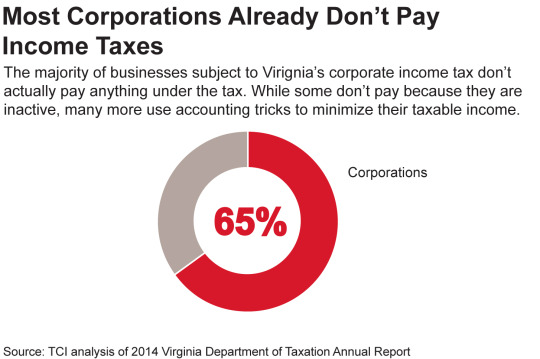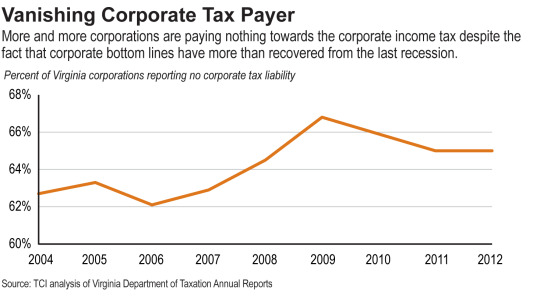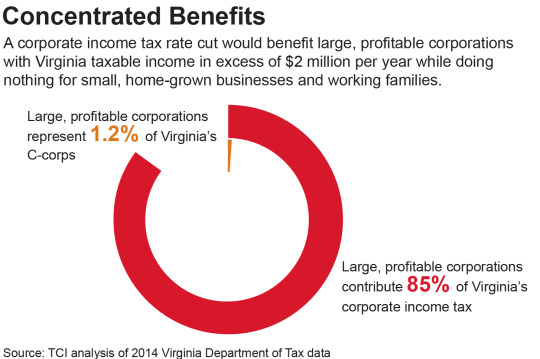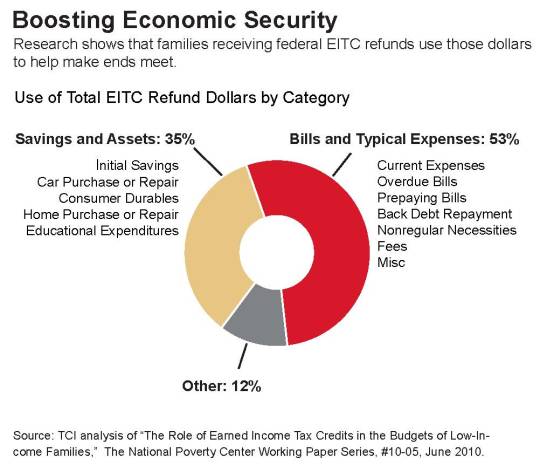December 8, 2015
6 Things to Know About Why the Governor’s Corporate Tax-Cut Proposal Won’t Work as Promised
Cutting taxes for corporations at the same time that we are laying off school staff and raising college tuition is not the way to build a strong middle class and a prosperous Virginia economy. Governor McAuliffe’s recently proposed tax break for big, profitable corporations won’t help Virginia’s economy and should not be enacted.
Here are six things about Virginia’s tax structure that show why:
1. Roughly two-thirds of corporations already don’t pay any income taxes in Virginia despite this being a time of record high corporate profits.

2. The percentage of corporations not paying the corporate income tax has increased over time. Some argue that the recession is to blame for the rising share of corporations with no tax liability, but corporations’ bottom lines have more than recovered in recent years while the share that pay corporate income taxes hasn’t.

3. Cutting the corporate income tax will benefit large, profitable corporations and have negligible benefit for Virginia’s economy. That’s because 85 percent of the revenue generated from the corporate income tax comes from the tiny fraction of corporations that report Virginia profits in excess of $2 million. While paying less in corporate income taxes will pad corporations’ bottom lines, this will do nothing for small, home-grown businesses and middle-class Virginians.

4. Tax rates aren’t at the top of the list for companies deciding where to locate. According to JLARC’s 2010 report on Virginia’s Corporate Income Tax, “Although taxes are an important component of their cost of doing business, corporations tend to rank several other business factors as more critical to a project’s success.” And Virginia’s corporate income tax rate and overall structure compare favorably against the states we compete against most often.

5. Corporate income tax cuts don’t result in massive job growth and Virginia’s most recent experience proves that. Supporters of the corporate tax cut say it will help bring jobs. But checking in with Virginia’s most recent corporate tax cut shows that’s not the case. In 2009, Virginia tax law was changed for manufacturers to reduce how much they are taxed in Virginia under the assertion that it would boost manufacturing employment. Unfortunately, the manufacturing sector has not been revived by the tax cut while the vital revenue stream from the corporate income tax declined by almost $60 million a year. That’s money that could be used for schools, transportation, and other investments that really make a state more attractive to businesses. Most recently, corporate income tax collections for the first three months of this budget year were down 9.0 percent because a few large corporations paid less, possibly due to the continued phase-in of the tax cut.

6. There’s a better investment in local businesses and hard-working Virginians. While corporate profits have been soaring, the wages for most Virginians have been flat. The governor should be proposing a bottom-up tax cut for working families by strengthening the state’s earned income tax credit. This would help families who work hard and are paid too little to make ends meet keep more of their wages. By doing that, Virginia’s hard-working families will have more money in their pockets, which they typically spend at local businesses. That would truly help our economy grow stronger.

– Massey Whorley, Senior Policy Analyst
